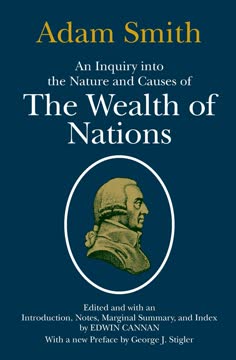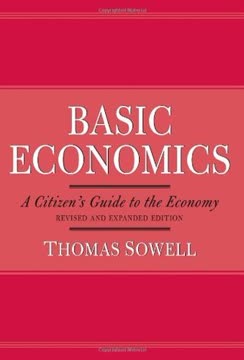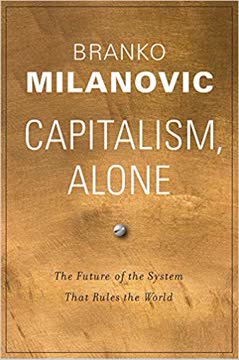Key Takeaways
1. The Market System: A Revolutionary Solution to Survival
It was the most important revolution, from the point of view of shaping modern society, that ever took place—fundamentally more disturbing by far than the French, the American, or even the Russian Revolution.
Beyond Tradition and Command. For centuries, societies relied on tradition or command to organize their economies. The market system, a radical departure, emerged as a third way, where individual self-interest, guided by the "invisible hand," became the primary driver of economic activity. This shift was not a peaceful evolution but a wrenching revolution that fundamentally altered social structures.
The Paradox of Self-Interest. The market system's core paradox is that it achieves social order and productivity by allowing individuals to pursue their own monetary gain. This seemingly chaotic system, where everyone is out for themselves, surprisingly results in the necessary tasks of society getting done. The lure of profit, not tradition or authority, steers the great majority to their tasks.
The Birth of Economics. The market system's complexity and counterintuitive nature gave rise to the field of economics. Unlike the simplicity of custom and command, the market system required economists to explain how a society could function when each person was free to pursue their own self-interest. This new system, with its abstract concepts of land, labor, and capital, called for a new way of understanding the world.
2. Adam Smith's Invisible Hand: Self-Interest and Competition
It is not from the benevolence of the butcher, the brewer, or the baker that we expect our dinner, but from their regard to their self-interest.
Self-Interest as a Driving Force. Adam Smith posited that self-interest, not benevolence, is the primary motivator in economic activity. Individuals, driven by their desire for gain, are guided to perform tasks that society needs. This self-interest, however, is not unchecked; it is regulated by the force of competition.
Competition as a Regulator. Competition acts as an invisible hand, preventing individuals from exploiting others. When one person tries to charge too much or pay too little, competitors step in to offer better deals, thus keeping prices and wages in check. This interplay of self-interest and competition ensures that society's needs are met.
The Market's Self-Regulating Mechanism. The market system is self-regulating, adjusting prices, quantities, and incomes based on public demand. If demand for a product rises, prices and profits increase, attracting more producers. This increased production eventually lowers prices, restoring equilibrium. This dynamic process ensures that society's resources are allocated efficiently.
3. Malthus and Ricardo: The Gloomy Limits of Progress
The power of population is so superior to the power of the earth to provide subsistence ... that premature death must in some shape or other visit the human race.
Malthus's Population Trap. Thomas Malthus argued that population grows geometrically while food production increases arithmetically, leading to a perpetual struggle for survival. He believed that the human reproductive urge would inevitably outstrip the means of subsistence, resulting in poverty, disease, and famine. This grim outlook challenged the optimistic view of progress.
Ricardo's Class Conflict. David Ricardo, unlike Smith, saw society as divided into warring classes: landlords, capitalists, and workers. He argued that as population grew, the cost of producing food would rise, benefiting landlords at the expense of capitalists and workers. This conflict of interest, particularly the landlords' power over grain prices, led to a pessimistic view of social harmony.
The End of Universal Progress. Malthus and Ricardo challenged the idea that everyone would benefit from economic progress. Malthus saw population growth as a barrier to improvement, while Ricardo saw class conflict as an inherent feature of capitalism. Their theories painted a picture of a society where some would always be condemned to poverty, and others would gain at the expense of the rest.
4. Utopian Socialists: Dreams of a Better World
Man is the creature of circumstances.
Rejection of Capitalism's Harshness. Utopian socialists like Robert Owen, Saint-Simon, and Charles Fourier sought to create ideal societies that transcended the inequalities and injustices of capitalism. They envisioned communities based on cooperation, equality, and the elimination of private property.
Owen's Villages of Cooperation. Robert Owen, a successful factory owner, attempted to create model communities where workers lived and worked together in a harmonious environment. He believed that by changing the environment, he could transform human behavior and create a more just society. His experiment at New Lanark, while successful, was not scalable.
Saint-Simon's Industrial Religion. Saint-Simon envisioned a society organized around the principles of industrial production, where the most productive members of society would be rewarded. He believed that society should be run like a factory, with a focus on efficiency and social contribution. His followers, the Saint-Simonians, formed a kind of industrial religion.
Fourier's Phalansteries. Charles Fourier proposed the creation of phalansteries, self-contained communities where people would work at tasks they enjoyed. He believed that by organizing society around individual passions, he could create a harmonious and productive world. His ideas, while eccentric, inspired many attempts at communal living.
5. Marx's Inexorable System: Capitalism's Self-Destruction
The development of modern industry... cuts from under its feet the very foundation on which the bourgeoisie produces and appropriates products. What the bourgeoisie therefore produces, above all, are its own gravediggers. Its fall and the victory of the proletariat are equally inevitable.
Dialectical Materialism. Karl Marx's theory of history, dialectical materialism, posits that economic forces drive social change. He argued that every society is built on an economic base, which shapes its social, political, and ideological superstructure. Changes in the mode of production lead to class conflict and ultimately to revolution.
Surplus Value and Exploitation. Marx argued that profits arise from the exploitation of labor. Workers are paid only the value of their labor power, which is less than the value they create. This "surplus value" is appropriated by capitalists, leading to an inherent conflict between the two classes.
Capitalism's Inevitable Collapse. Marx believed that capitalism was inherently unstable and would eventually collapse due to its internal contradictions. The drive for profit would lead to overproduction, economic crises, and the concentration of wealth in fewer hands. This would ultimately lead to a proletarian revolution and the establishment of a classless society.
6. The Victorian World and the Rise of Academic Economics
There is nothing which requires more to be illustrated by philosophy than trade does.
The Victorian Boom and Optimism. The Victorian era in England was marked by economic growth and a sense of progress. This optimism led to a shift in economics from a broad social philosophy to a more specialized academic discipline. Economists focused on refining existing theories rather than questioning the fundamental nature of capitalism.
The Rise of Mathematical Economics. Economists like Edgeworth, Jevons, and Walras sought to make economics more scientific by using mathematics to model economic behavior. They focused on concepts like equilibrium and utility, often abstracting away from the social and historical context of economic activity.
The Underworld of Economics. While academic economics became more formalized, an "underworld" of dissenting voices emerged. These heretics, like Malthus, the Utopians, and Henry George, challenged the prevailing orthodoxy and raised questions about the social and moral implications of capitalism. They were often ignored or dismissed by the mainstream.
7. Veblen's Savage Critique: Conspicuous Consumption and Waste
With the greater part of rich people, the chief enjoyment of riches consists in the parade of riches, which in their eye is never so complete as when they appear to possess those decisive marks of opulence which nobody can possess but themselves.
The Leisure Class and Conspicuous Consumption. Thorstein Veblen, an American economist, critiqued the values of the wealthy, arguing that they engaged in "conspicuous consumption" to display their social status. He saw the pursuit of wealth as a modern form of barbarism, where people sought to emulate the leisure class through wasteful spending.
The Degradation of Labor. Veblen argued that the leisure class's disdain for productive work had led to a general devaluation of labor. He saw the modern world as a place where people were driven by a desire to emulate the wealthy, rather than by a genuine appreciation for craftsmanship or social contribution.
The Machine and the Business System. Veblen saw a fundamental conflict between the machine and the business system. The machine, with its emphasis on efficiency and precision, was at odds with the business system's focus on profit and financial manipulation. He believed that the business system was a form of sabotage that disrupted the smooth functioning of the productive process.
8. Keynesian Revolution: Government Intervention and Economic Management
In the long run we are all dead.
The Great Depression and the Failure of Classical Economics. The Great Depression of the 1930s exposed the limitations of classical economics, which failed to explain or remedy the widespread unemployment and economic stagnation. This crisis paved the way for the Keynesian revolution.
The Role of Aggregate Demand. John Maynard Keynes argued that the level of economic activity is determined by aggregate demand, the total spending in an economy. He believed that during a depression, private investment is insufficient to maintain full employment, and that government intervention is necessary to stimulate demand.
Government Spending as a Tool for Economic Management. Keynes advocated for government spending as a means of boosting aggregate demand and pulling an economy out of a slump. He argued that government investment in public works and other projects could create jobs and stimulate economic activity. His ideas provided a theoretical justification for the New Deal policies of the 1930s.
9. Schumpeter's Creative Destruction: The Entrepreneurial Engine of Capitalism
The fundamental impulse that sets and keeps the capitalist engine in motion comes from the new consumers’ goods, the new methods of production or transportation, the new markets, the new forms of industrial organization that capitalist enterprise creates.
The Entrepreneur as the Driving Force. Joseph Schumpeter emphasized the role of the entrepreneur as the key driver of capitalist development. He saw the entrepreneur as an innovator who disrupts the "circular flow" of the economy by introducing new products, processes, and markets.
Creative Destruction. Schumpeter argued that capitalism is characterized by a process of "creative destruction," where new innovations constantly displace old ones. This process, while disruptive, is essential for economic growth and progress.
Capitalism's Inevitable Decline. Despite his admiration for capitalism's dynamism, Schumpeter believed that it would eventually be undermined by its own success. The rationalist mindset fostered by capitalism would erode the social and cultural values that sustained it, leading to its eventual replacement by socialism.
10. The End of the Worldly Philosophy?: A New Vision for Economics
The study of economics does not seem to require any specialized gifts of an unusually high order. Is it not, intellectually regarded, a very easy subject compared with the higher branches of philosophy or pure science? An easy subject, at which very few excel!
The Rise of "Scientific" Economics. Modern economics has increasingly adopted the methods of science, emphasizing mathematical models and statistical analysis. This shift has led to a more precise and rigorous approach to economic inquiry, but it has also come at the cost of neglecting the social and political dimensions of economic life.
The Disappearance of Capitalism. The term "capitalism" has largely disappeared from mainstream economic discourse. Instead, economists focus on abstract models of markets and individual behavior, often ignoring the historical and institutional context of economic activity. This shift reflects a desire to create a more universal and objective science of economics.
The Need for a New Vision. The future of economics requires a new vision that integrates the insights of the past with the challenges of the present. This new vision must acknowledge the limitations of purely scientific approaches and embrace the social, political, and ethical dimensions of economic life. It must also recognize the need for a more adaptable and socially responsible form of capitalism.
Last updated:
FAQ
What's The Worldly Philosophers about?
- Exploration of Economic Thinkers: The book examines the lives and ideas of major economists like Adam Smith, Karl Marx, and John Maynard Keynes, highlighting their contributions to economic thought.
- Interplay of Ideas and Society: Heilbroner shows how these economists influenced not just economic theory but also the political and social landscapes of their times.
- Historical Context: The narrative is set against historical events, illustrating how economic theories emerged in response to societal needs and crises.
Why should I read The Worldly Philosophers?
- Understanding Economic Foundations: It provides a comprehensive overview of foundational economic theories that continue to influence modern economics.
- Engaging Narrative Style: Heilbroner’s writing is accessible and engaging, making complex ideas understandable for readers without a background in economics.
- Relevance to Current Issues: The discussions on capitalism, socialism, and economic crises offer insights into ongoing economic debates.
What are the key takeaways of The Worldly Philosophers?
- Economic Ideas Shape Society: Economic theories have real-world implications that can alter the course of history.
- Diverse Perspectives: The book presents a range of viewpoints from different economists, encouraging critical thinking about economic policies.
- The Role of Vision: Understanding the visions behind economic theories can provide deeper insights into their implications.
How does The Worldly Philosophers address the relationship between capitalism and socialism?
- Contrast of Economic Systems: Heilbroner explores the fundamental differences between capitalism and socialism, particularly in terms of ownership and resource allocation.
- Historical Context of Conflict: The book discusses historical tensions between these systems, especially during economic crises.
- Contemporary Relevance: The discussion remains relevant as societies grapple with balancing free markets and social welfare.
What is the "invisible hand" concept in The Worldly Philosophers?
- Market Self-Regulation: The "invisible hand" refers to the self-regulating nature of the marketplace, where individual self-interest leads to societal benefits.
- Competition Drives Efficiency: It suggests that competition among businesses leads to better products and services at lower prices.
- Critique of Central Planning: Heilbroner uses this concept to critique systems that rely heavily on government planning.
What is surplus value according to The Worldly Philosophers?
- Definition of Surplus Value: Surplus value is the difference between the value produced by labor and the actual wage paid to the laborer.
- Exploitation of Labor: This concept highlights the exploitation inherent in capitalist systems, where workers are paid less than the value they create.
- Impact on Class Struggle: Surplus value underscores the conflict between the interests of workers and capitalists, driving historical change.
How does Heilbroner define capitalism in The Worldly Philosophers?
- Dynamic Economic System: Capitalism is characterized by private ownership of production and the pursuit of profit.
- Interdependence of Public and Private: Both government and private enterprise play crucial roles in shaping economic policies.
- Contradictions and Challenges: The coexistence of wealth and poverty within capitalism necessitates ongoing reflection and reform.
What is the significance of Henry George's ideas in The Worldly Philosophers?
- Critique of Land Ownership: George challenged the morality of land ownership and the concept of rent, arguing it contributed to social inequality.
- Single Tax Proposal: He proposed a single tax on land value to promote fairness and eliminate other taxes.
- Moral Dimension of Economics: George's work emphasizes the need for ethical considerations in economic policies.
How does The Worldly Philosophers explain the evolution of economic thought?
- Historical Progression: Heilbroner traces the development of economic thought from early philosophers to modern economists.
- Interconnected Ideas: Economic theories are influenced by historical events, social conditions, and previous thinkers.
- Changing Perspectives: Perspectives on economics have shifted over time, reflecting changes in society and technology.
What are the criticisms of capitalism presented in The Worldly Philosophers?
- Inequality and Injustice: The book highlights the persistent inequalities within capitalist systems.
- Environmental Concerns: Heilbroner raises concerns about the environmental impact of capitalist growth.
- Moral Implications: The text critiques the moral foundations of capitalism, questioning the justification for profit-seeking behavior.
What are the best quotes from The Worldly Philosophers and what do they mean?
- “The ideas of economists and political philosophers... are more powerful than is commonly understood.”: This emphasizes the significant impact that economic theories have on society and politics.
- “In the long run, we are all dead.”: Keynes underscores the urgency of addressing economic issues in the present.
- “Capitalism creates a critical frame of mind.”: Schumpeter's observation points to the self-reflective nature of capitalist societies.
What is the future of capitalism according to The Worldly Philosophers?
- Potential for Reform: Heilbroner suggests that capitalism can adapt in response to social pressures.
- Challenges Ahead: Significant challenges include economic inequality and environmental sustainability.
- Vision for a Balanced Economy: The book presents a vision of capitalism that balances economic growth with social responsibility.
Review Summary
The Worldly Philosophers is praised as an engaging introduction to economic thought, offering accessible biographies and explanations of influential economists' ideas. Readers appreciate Heilbroner's clear writing, historical context, and ability to make complex concepts understandable. The book covers major figures like Smith, Marx, and Keynes, tracing the evolution of economic theory. While some note its leftist perspective and omission of certain schools, many consider it essential reading for understanding economics' development and impact on society.
Similar Books










Download PDF
Download EPUB
.epub digital book format is ideal for reading ebooks on phones, tablets, and e-readers.





